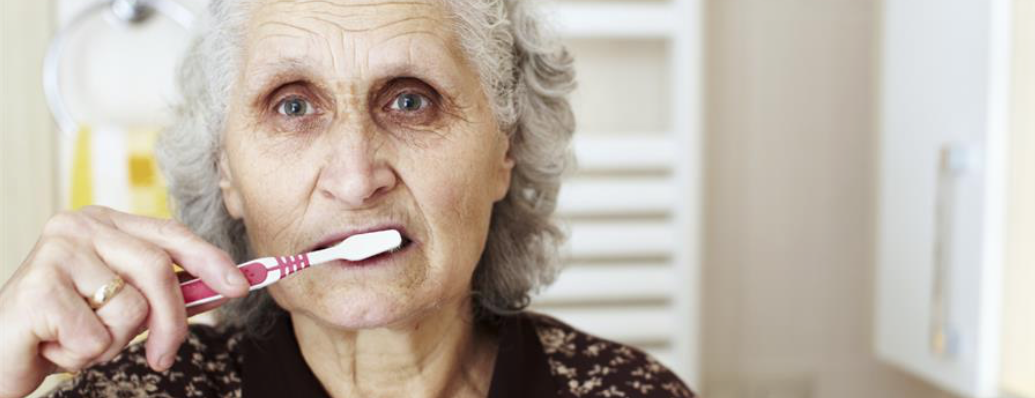
Dr. Natalie Archer writes in the McMaster University publication The Optimal Aging Portal. The article discusses how the quality of oral health among seniors points to neglect and shows we need to ‘brush up’ on mouth care.

Dr. Natalie Archer writes in the McMaster University publication The Optimal Aging Portal. The article discusses how the quality of oral health among seniors points to neglect and shows we need to ‘brush up’ on mouth care.

Sometimes I can’t believe we’re living in the year 2014. But when I see smart dental products for sale in the drug store, I know its true. To me this equipment says, ‘Welcome to the future, a world of possibilities’.
Today three manufacturers each claim to have the first smart toothbrush. Each company calls their product ‘smart’ by which they mean it collects data to acquire insights into user’s brushing habits and then displays that info on cellphone screens. Three separate offerings are now available to consumers.
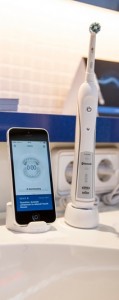
the smart toothbrush
In a connected world, where everything is data driven and bent on educating users, the bathroom is set to become the foremost personal healthcare center in each family dwelling. The master bedroom on-suit washroom in particular will probably become the house’s #1 wellness portal, and humans will interface with medical technology here using a smart bathroom mirror. The dispensary will issue all manner of common remedies, first aid equipment and beauty tips. Such tools available to bathroom users will almost certainly include a smart toothbrush.
That’s because the simple act of brushing their teeth is probably the most common health & wellness related activity that human beings perform on a daily basis. And as time goes on, more and more researchers agree, oral care is an important part of preventive health. The latest research shows many correlations between oral health and overall wellness, and so there’s plenty of evidence to suggest that poor brushing patterns can lead to more than just bad teeth. Not brushing regularly is the biggest cause of cavities and gum disease and this is a problem that smart toothbrushes can easily fix.
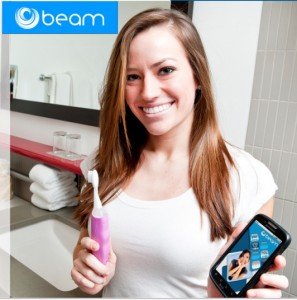
beam smatr toothbrush
Beam Brush claims to be the world’s first smart toothbrush that monitors oral hygiene habits and reports them to a smartphone app. This claim is reinforced by a CNN article about Kolibree which points at the Beam Brush as being the first smart electric toothbrush and one which first went on sale in 2013, making it the first of its kind in the USA.
Beam toothbrush also connects to phones via Bluetooth and records brushing time – however unlike the Kolibree it doesn’t track the brush’s movements inside the user’s mouth. Beam Brush has a small light in the neck that will glow for approx two minutes which is each user’s recommended brushing time.* Later the app will sync the unit with your smartphone and share information. The brush can store up to 49 brushings or about 3.5 weeks worth of data if you brush twice a day.
Test data presented by the app developer shows the average person brushes their teeth for only 45 secs, but over half the respondents demonstrated they were more likely to brush their teeth for a full two minutes if presented with a simple timer. The Beam Brush app was thus configured for brushing twice a day for two minutes. The user can set the app to play a song on their phone while they’re brushing – this is great for kids. The estimated battery life of the brush is 90 days. The app offers ‘Beam Goals’ which allows users to set individual oral hygiene targets. Users also have the option to send their brushing information to their dentist.

BeamBrush
Beam Brush is equipped with a replaceable head, so multiple heads can thus be paired with one smartphone, a function aimed at parents in particular who want to keep track of their children’s brushing habits. In addition, the app alerts the user when it is time to replace the brush head. Extra heads can even be ordered automatically via the phone.
Beam Brush App keeps children engaged through the interactive timer that will play their favorite song while they brush? and the goals that will give them rewards for great brushing! Big families can use multiple Beam Brushes with one smartphone. Connecting multiple brushes allows users to create goals in which siblings can compete to be the best brusher!
Beam believes that it’s simply not good enough just to collect data, but rather the challenge is to display that data in environments where it can reinforce or even cause behavior change. The Beam Brush uses mobile rewards platform Kiip to bring our users real world rewards for demonstrating great brushing habits. Kiip is also ‘smart’ and learns user’s reward preferences over time so they can get more of what they want. Available in pink or blue, Beam Brush retails for $25 and replacement heads are $4 each. One AA Alkaline Battery will last over three months.
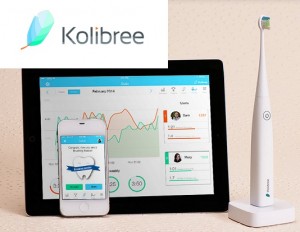
kolibree, smart toothbrush, connected bathroom
Kolibree is a French-based company dedicated to creating connected appliances that make users smarter, more aware and better equipped to improve their own and other people’s health and lives. These guys have created an easy-to-use compelling interactive experience around brushing your teeth, and especially comparing family brushing habits and making it all more enjoyable by gaming the exercise.
Kolibree toothbrush was invented by Thomas Serval, a French engineer and something of a name in France’s tech industry. The story is that he was inspired to design it after suspecting that his children were lying to him about whether or not they had brushed their teeth. He wanted proof and so he designed a smart toothbrush to spy on them.
Kolibree is the world’s first connected toothbrush, unveiled at CES for the first time in Feb 2014. This high technology toothbrush is fitted with an accelerometer, gyroscope and a magnetometer, which the company says allows the device to record data, such as the time, duration and frequency of the brush, along with which teeth are properly cleaned, and those that are being neglected. It’s different in many ways than other smart toothbrush devices that are listed in this article; the Kolibree smart toothbrush can analyze each user’s brushing habits and then display them on a mobile phone or tablet.
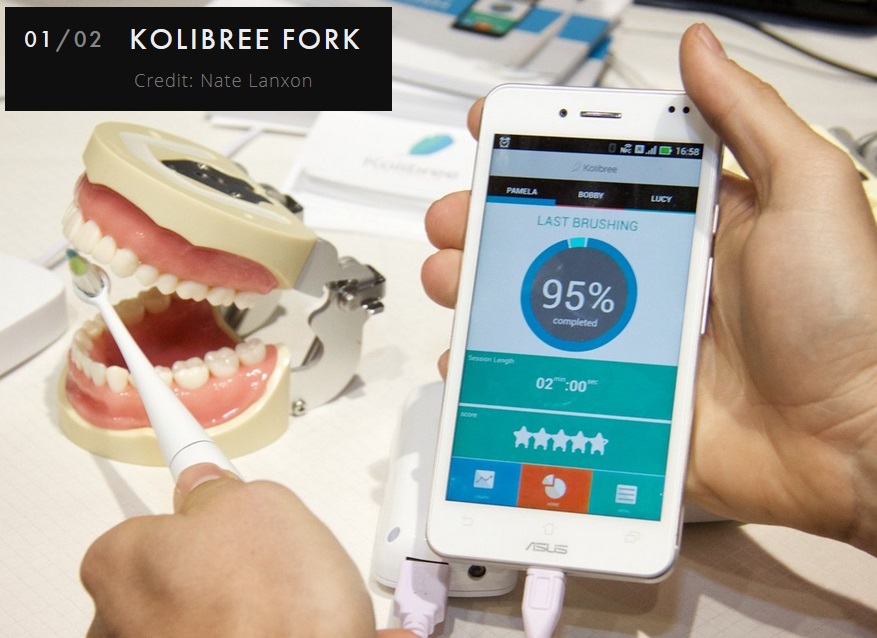
Kolibree Fork by Nate Lanxon
Users’ brushing data automatically goes to their phones whereupon the app alerts them if they’re brushing long enough, or whether or not they remembered to brush their teeth at all.
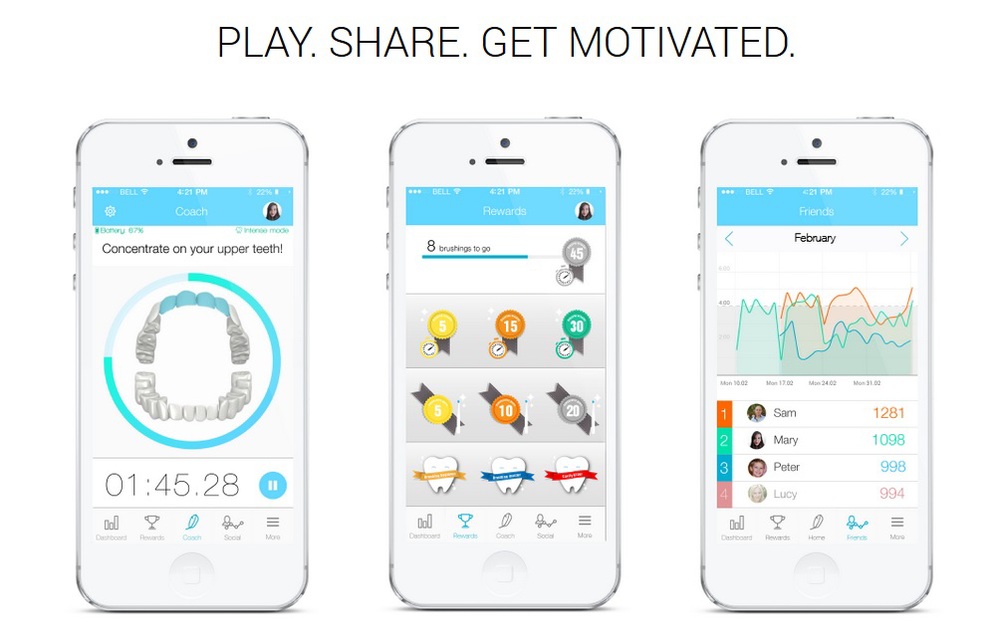
play and share dental brushing habits
Like all the other available models, Kolibree Smart Toothbrush enables users to share their brushing data with their family or even their dentist. However they can also choose privacy. The app remembers and tracks up to five profiles and allows users to compare and ‘gamify’ brushing stats between them on a series of pretty time scaled graphs to award a score for brushing based on time, technique and overall coverage – cool huh.
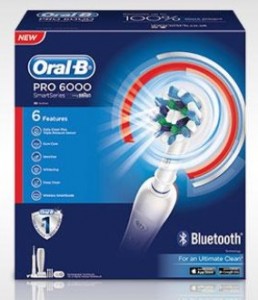
Oral B Smart toothbrush PRO 6000
Oral-B interactive electric toothbrush with Bluetooth 4.0 connectivity and the Oral-B App will be available in limited quantities in Germany this spring, with a global rollout – including the SmartSeries in June 2014. The world got its first look at the device back in February 2014 at Barcelona’s Mobile World Congress 2014.
At the Mobile World Congress 2014 the Oral-B Smart Series consisted of two models. The Oral-B Pro 6000 which costs about £229.99, and the Oral-B Limited Edition Pro 6500 Smart Series is priced at £249.99.
The new Oral-B App will be available in iOS in May, and in Android in August. The company actually envisions what they call a ‘well connected bathroom’ with a smart mirror in their advertising, and their trade show displays which are visible in various pieces online. Dr Natalie Archer saw some of the German marketing in airports while traveling earlier this spring, and she was impacted by the idea. She commissioned me to look into what she thought was the world’s first smart toothbrush.
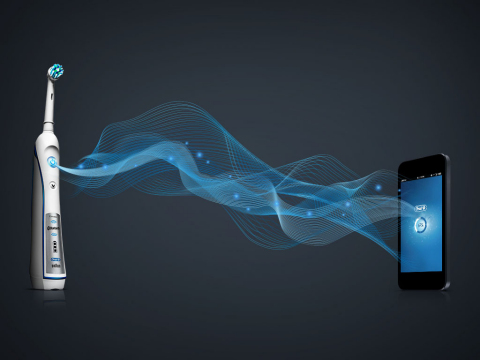 But of course Oral – B is the giant in the room. They’re a market leader and their products are expected to be of the highest quality and reflect years of overall testing and performance. They have registered Connected Toothbrush as their product information portal .
But of course Oral – B is the giant in the room. They’re a market leader and their products are expected to be of the highest quality and reflect years of overall testing and performance. They have registered Connected Toothbrush as their product information portal .
The big idea behind the Oral-B app is that it can help keep users motivated and informed while brushing with oral care tips, and even News and Weather information. Its keeps users brushing longer. Oral-B claims that tests of the app show that when connected, brushing time increases from less than 60 seconds with a manual toothbrush, to over two minutes ten seconds with the electric toothbrush, surpassing the dental professions’ recommended two-minute brushing time per session. Dentists can also program their brushing routines in the app to help improve patients’ brushing behaviours and focus on problem zones within their mouth. The smart toothbrush features a smart app and intelligent Bluetooth 4.0 enabled handle, as well as boasting six customizable cleaning modes.
Will you buy a smart toothbrush? Which one?
“Ask Archer Dental” is a chance for you to ask us any of your dental questions or concerns. Our team will answer as many of your questions as possible every month. We hope this feature will help to relieve anxieties that some may experience when thinking about visiting the dentist or other dental worries. You can send us your questions via email or Twitter @archerdentalca
The Cause of Dry Mouth
With the arrival of allergy season comes the side effects of dry mouth (also referred to as Xerostomia) often caused by popular over the counter allergy medications. Antihistamines commonly used to alleviate allergy symptoms, such as watery eyes or itchy nose, can cause a drying effect in your oral cavity. Dry mouth becomes problematic because we all need saliva to cleanse, moisten and fight against infection in our mouths.
The Signs and Symptoms of Dry Mouth
Symptoms of dry mouth include a dry, sticky feeling in the throat and mouth, burning or tingling of the tongue, difficulty chewing, speaking or swallowing, cracked lips and corners of the mouth and bad breath. From a dental perspective, dry mouth causes increase risk of gingivitis, infections, tooth decay and uncomfortable denture wear.
What Can You Do to Help?
To improve dry mouth seek the guidance of your doctor to see if changing your dose of allergy medication can help. Otherwise, try to improve your salivary flow by sucking on sugar free candy, chewing gum, increasing your water intake, using a room vaporizer to moisten the air at night, or trying artificial salivary substitutes, such as Biotene products that can be found at any drug store. Lastly, protect your teeth by using a fluoridated toothpaste and visit your dentist on a regular basis.

Answered by Chandula Samarajeeva,
RDH at Archer Dental
The New York City Elder Abuse Center writes about the D.E.A.R Project
Recently the New York City Elder Abuse Center (NYCEAC) covered the D.E.A.R Project on their weekly Elder Justice Dispatch Blog – check out the article below. Thank you to the NYCEAC for your support and collaboration!
Mrs. Jones1 was an 87 year-old retired teacher who spent her life raising her family, educating the children of her community and volunteering at the local community center. She lost her husband at age 80 and was diagnosed with mild Alzheimer’s disease at age 85. She was known in her community for her brilliant smile. Mrs. Jones’ retirement benefits didn’t cover dental care; however, her daughter, Susan, continued driving her mother to appointments with her lifetime dentist for basic cleanings and Mrs. Jones paid the bill using some of her own money as well as support she received from a public dental program. After her Alzheimer’s disease diagnosis, her dentist began directing his questions about her future oral care to Susan, even though Mrs. Jones was capable of making her own dental decisions. During one visit, the dentist reported hearing Susan say that she was “more interested in preserving her “inheritance” than her mother’s oral health.” As a result, Mrs. Jones stopped smiling.
When Mrs. Jones’ dentist started asking Susan “one too many questions” about the state of her mother’s oral health, which included gum disease, decay, broken teeth and abscesses, Susan stopped taking her mother to the dentist altogether. Weeks later Mrs. Jones was admitted to hospital for pneumonia and her oral infections were so advanced that surgical intervention was required. Mrs. Jones spent years in pain, lost the ability to chew or speak clearly and died of pneumonia, which was an entirely preventable condition caused secondarily to oral infection.
Mrs. Jones’ case is a common reality of dental elder abuse and neglect in Canada. Many dentists may think that geriatric dentistry is not something that they will practice. However, with Canada’s rapidly aging population, 1 in 5 people will be over the age of 65 by about 2030. All dentists will practice geriatric dentistry – simply because the number of older adults in our society will be so high. In Canada and in the US, many older adults pay for their own dental care, which is expensive and creates barriers to accessing services. The Canadian government provides some support through several programs. In the US, Medicare covers medically necessary dental services done in hospital settings and, in some states, community based dental services. Medicaid pays for adult care in a limited number of states and dental services for institutionalized older adults. In addition, there are some Medicare Advantage Plans that cover limited dental services; however, the coverage is not standardized across plans.
 As a result of cases such as Mrs. Jones’ and others, the Dental Elder Abuse Response (D.E.A.R.) project was created by Dr. Natalie Archer and Laura Tamblyn Watts. D.E.A.R is dedicated to raising awareness about the seriousness of dental elder abuse, which happens when a person or system fails to provide the necessary dental care for an older adult (Click here for more).
As a result of cases such as Mrs. Jones’ and others, the Dental Elder Abuse Response (D.E.A.R.) project was created by Dr. Natalie Archer and Laura Tamblyn Watts. D.E.A.R is dedicated to raising awareness about the seriousness of dental elder abuse, which happens when a person or system fails to provide the necessary dental care for an older adult (Click here for more).
“Dental elder abuse can cause pain, suffering and illness for the older person. It can even lead to cases of preventable death.” – Dr. Natalie Archer
The DEAR project fights dental elder abuse by:
Click here to watch a Rogers TV interview featuring Dr. Natalie Archer speaking in depth about dental health and elder abuse. Do you want to review the educational tools and materials created through this project. (Please note that you may need to scroll down to the bottom of the page to access the tools)
DEAR is supported by a community-based grant from the New Horizons for Seniors Program – Employment and Social Development Canada and is a joint pilot project., the Canadian Centre for Elder Law, and the National Initiative for Care of the Elderly.
By Cara Kenien, LMSW, MPA, NYCEAC Social Media Manager & Allison Calcutt, Archer Dental Communications Coordinator, D.E.A.R Project Manager, & contributing authors, Natalie Archer, DDS, Archer Dental, D.E.A.R Project Lead, Laura Tamblyn Watts, LLB, SJD (in progress), D.E.A.R Project Lead, Canadian Centre for Elder Law Senior Fellow and NICE Network Law and Aging Theme Team Leader and Kavita P. Ahluwalia, DDS, MPH, Associate Professor at the College of Dental Medicine at Columbia University..
1. Mrs. Jones’ story is an example of dental elder abuse. It is not an actual case.
On April 19, 2014 Dr. Archer appeared on Citytv’s Downright Domestic to discuss Senior Dental Care. Host, Rebecca Webster, got a tour of the Runnymede Dental Centre and learned about our clinic’s unique features.
In the March 2014 Edition, SNAP Bloor West featured an article along with some great pictures from the D.E.A.R Project’s Launch Event.
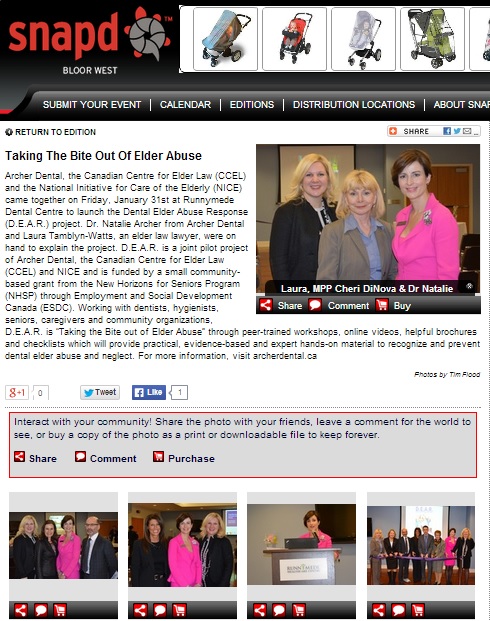
On March 29, 2013, Toronto Dentist, Dr. Natalie Archer, appeared on Rogers Daytime Toronto to discuss the importance of oral hygiene, especially as we grow older, with host Val Cole.
Dr. Archer outlines oral health tips that those of all ages can implement to ensure their oral hygiene stays at its best as we grow older. Dr. Archer explains that the mouth is the primary portal to the body and must be clean and infection-free in order for us to have a healthy body.
Check out the simple tips that you can start to incorporate into your oral care routine today!
Five Simple Oral Hygiene Tips